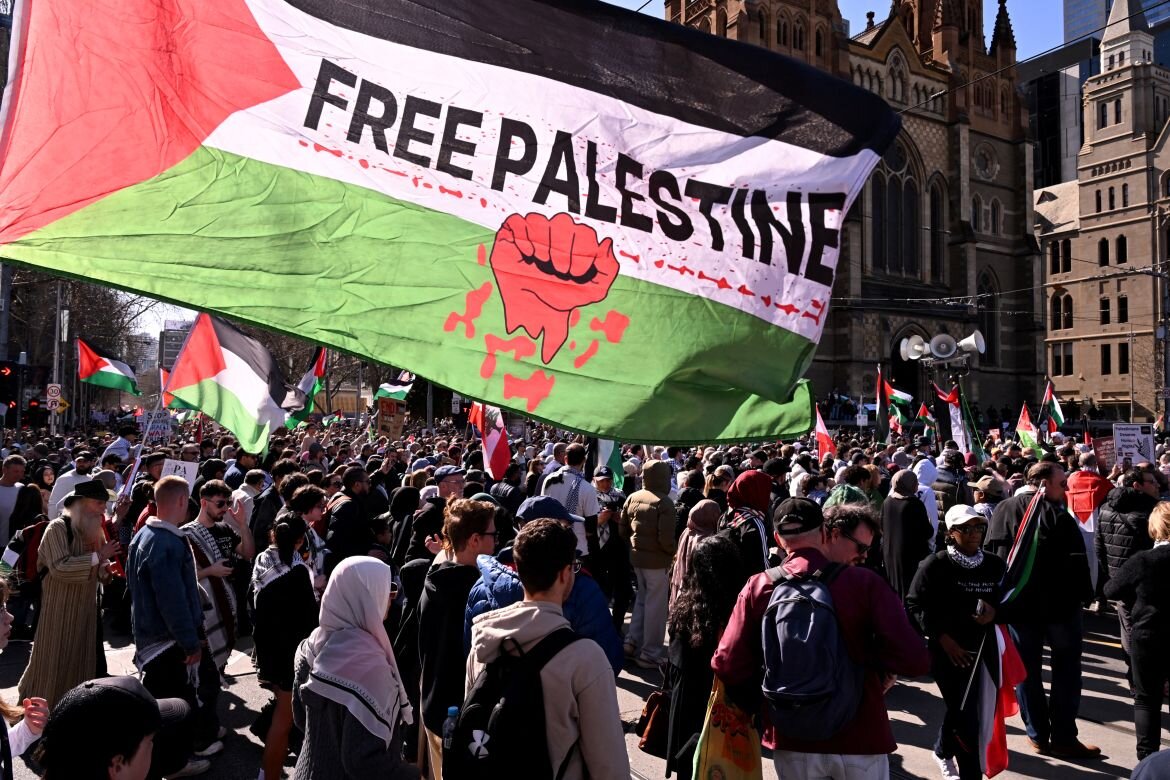How rising voices for Gaza have shaken Australia

TEHRAN – Over the past two years, Australia has experienced a remarkable rise in pro-Palestine activism, as increasingly frequent and expansive demonstrations have mobilized citizens across the nation in solidarity with Gaza and condemnation of Israeli military conduct.
These rallies—now more consistent and widespread—have sought justice for Palestinians and spotlighted Australian complicity in Israel’s ongoing war on Gaza.
Early protests in Sydney and Melbourne drew thousands carrying Palestinian flags and chanting calls for ceasefires. By early 2024, weekly marches—especially in Melbourne, where Jewish peace activists occupied government buildings to protest the arms trade with Israel—became common and more organized.
This year in August, tens of thousands converged on the Sydney Harbour Bridge for a mass march. Building on this momentum, more than 40 cities nationwide soon hosted demonstrations. Organizers claimed as many as 350,000 people participated across the country, from Brisbane’s 50,000-strong turnout to massive crowds in Melbourne.
Demonstrators demanded an end to the violence in Gaza, recognition of the genocide and famine, sanctions on Israel, a halt to Australia’s arms trade, and an immediate ceasefire.
Officials offered mixed reactions: some labeled the movement divisive, while others faced mounting pressure. The Australian government drew intense criticism for maintaining arms exports and avoiding sanctions—actions viewed by many as enabling Israeli violence. Organizers and Greens predicted mounting political pressure after the unprecedented mass turnouts.
Australia’s historical position and complicity
Australia’s longstanding support of Israel dates back to the 1947 UN vote, when Australia co-chaired the committee that endorsed the partition plan, and in 1949 established ties with Israel.
Since then, successive governments—both Labor and Conservative—have maintained strong bilateral relations.
Commitments have extended to military cooperation and defense support, including Australian-supplied components used in Israeli F-35 jets.
Human rights groups and protesters argue these ties effectively facilitate Israeli military actions in Gaza, raising concerns over complicity.
The Israel lobby’s influence
The Australia/Israel & Jewish Affairs Council and similar groups are perceived as highly influential in shaping political discourse, including sponsoring parliamentary trips to Israel.
Critics, including former foreign minister Bob Carr, have described this as a form of foreign influence shaping policymaking and media narratives.
Journalist John Lyons has documented pressure on media outlets to downplay or censor criticism of Israel. The lobby’s efforts to equate Palestine solidarity with antisemitism have faced backlash as public sentiment shifts.
Diplomacy, recognition, and Israeli pressure
In August, Prime Minister Anthony Albanese announced that Australia will formally recognize the state of Palestine at the UN General Assembly in September, conditional on the Palestinian Authority disarming, recognizing Israel, and excluding Hamas from governance.
This positioned Australia alongside some Western states moving toward recognition of Palestinian statehood.
Even though some analysts described Canberra’s decision as “too little, too late,” Israeli Prime Minister Benjamin Netanyahu responded harshly, calling Australia delusional and claiming the decision undermined Israel’s security.
Israel’s ambassador warned that recognition enables Hamas, further straining bilateral relations. The fallout underscored Israel’s coercive pressure and revealed the growing rift between Australian public opinion and its government’s cautious diplomacy.
A rising voice
Labor Senator Fatima Payman emerged prominently in mid-2024, openly denouncing Israeli actions in Gaza as genocidal and calling on the government to recognize Palestine. She authored a widely circulated opinion piece criticizing the government’s lack of moral courage.
After crossing the floor to vote with the Greens in support of Palestinian statehood, Payman was suspended indefinitely from the Labor caucus, though she retained party membership at the time.
The suspension drew both criticism and solidarity from within her electorate and the wider Labor base. Soon after, she resigned from the party altogether.
As the first Afghan-Australian Muslim woman in Parliament, Payman framed her decision as an act of conscience and solidarity with oppressed peoples.
After launching and leading a new party called “Australia’s Voice,” she has vowed to continue pressing for recognition of Palestine, amplifying the voices of communities demanding justice and accountability, and has since emerged as a powerful national voice calling for sanctions on Israel and an end to Australia’s complicity in the war on Gaza.
